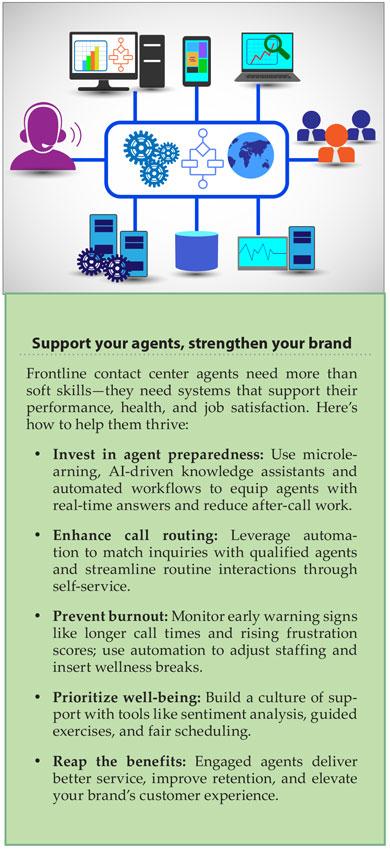The Green Sheet Online Edition
June 9, 2025 • 25:06:01
The winning formula for agent support: training + technology

Banking and financial services contact centers are the frontline of customer service. Agents must navigate frustrated callers and complex regulatory questions while maintaining professionalism and accuracy. But while they’re focused on supporting customers, agents need support themselves. Without it, they’ll risk burnout, customers will endure poor service and financial institutions will face reputational damage.
Achieving the right level of support is an art. It requires a good mix of technology, strategic training and a people-first approach. But getting it right allows your institution to build customer trust, strengthen agent engagement and improve overall efficiency. Here’s how.
Prepare for everything
When merchants call their merchant service provider, their inquiries are often complex. They may be navigating such pressing issues as a network outage, surge in chargebacks, fees they weren't expecting, tax questions or a compromised account.
An incorrect response or misrouted call can cost a customer valuable time and money. This is why preparation is key. Institutions that take a proactive approach will see improved agent morale, faster call resolution and higher customer satisfaction.
This approach should include:
- Investing in training,
- Optimizing workflows,
- Implementing automation solutions to support frontline agents.
Automated call routing can analyze the nature of customer inquiries and direct more complex tasks to the most qualified agent, while directing routine inquiries through self-service options. Real-time assistance can support agents during live conversations, flagging customer frustration or hesitation and offering on-screen prompts to guide interactions effectively.
Plus, automated summarization tools can reduce after-call work by transcribing key points of customer conversations, allowing agents to move quickly to the next caller. The goal is not to replace agents with technology, but to enable them to work more efficiently while maintaining a high standard of service.
Focus on training and stress management
Understandably, the high stakes involved in the acquiring side of banking and merchant services can weigh on agents’ stress levels and mental health. Financial institutions that fail to support their workforce risk increased absenteeism, higher attrition rates and lower service quality. Addressing agent stress isn’t just about reacting to problems as they arise; it’s about building a culture that prioritizes well-being from the start.
Merchants and other payment-accepting businesses expect expertise when they call for assistance, but if agents feel underprepared, they’re more likely to escalate calls, prolong interactions and increase customer frustration.
AI-driven knowledge assistants can surface relevant fraud protection and reporting practices, tax policies and procedural steps in real-time, ensuring agents have immediate access to accurate information.
Microlearning modules can provide targeted training between calls, reinforcing key financial regulations and other updates without disrupting workflow. When agents feel knowledgeable and supported, they handle calls with greater confidence, reducing stress and improving customer outcomes.
Beyond training, financial institutions must prioritize agent well-being. Overworked employees are more likely to disengage, make costly mistakes, or leave their jobs altogether. Wellness-focused automation can play a key role in maintaining agent resilience. Automated scheduling tools can dynamically insert breaks when call volume temporarily dips, preventing exhaustion before it sets in.
Real-time sentiment analysis can detect signs of stress or frustration in an agent’s voice, prompting supervisors to intervene with coaching, support or a schedule adjustment. Simple wellness interventions, such as guided breathing exercises, ergonomic prompts and clear workload expectations, can make a significant impact on preventing burnout.
Address agent burnout
Stress is a normal component of most jobs, and as long as it’s not allowed to accumulate, it’s generally manageable. When it’s not, it can lead to burnout.
To prevent the corrosive effects of burnout, supervisors must monitor early warning signs, such as increased after-call work, longer handling times, rising customer frustration scores and declining employee engagement metrics.
Advanced automation solutions can dynamically adjust staffing levels, ensuring that no single agent is overloaded while others remain underutilized. Automation can also provide supervisors with real-time alerts when agents exhibit signs of strain, allowing them to intervene early and prevent long-term performance declines.
By addressing burnout proactively rather than reactively, ISOs and other merchant service providers can create an environment where agents remain engaged and productive even under stressful conditions.
Valued agents value customers
A business thrives when customers feel valued—but the same principle applies to employees. Agents who feel appreciated, supported and well-equipped to do their jobs are more engaged, they perform better, and they stay with the company longer. Employees who feel valued are more committed to their work and are willing to go the extra mile for customers.
A workplace that prioritizes well-being fosters camaraderie, teamwork and mutual support. Engaged agents provide better service, leading to higher customer satisfaction and stronger financial results.
Contact centers don’t need to be places of burnout and frustration. With the right strategies in place, customer service and technical support staff can strengthen customer relationships, improve operational efficiency, and build a work environment where both agents and customers feel valued. When businesses put people first—both their customers and their employees—success follows. 
Jennifer Lee has 20 years’ experience in the contact center industry with more than 15 years as a people leader. Throughout her career, Jennifer has served in a variety of roles in the contact center space, including operations, quality, workforce management and client services. As president and co-CEO, Jennifer leads Intradiem's operations and people management. Prior to this role, Jennifer served as the company's chief operating officer, chief strategy officer and has led the customer success organization. Contact her via LinkedIn at linkedin.com/in/thejenniferlee.
Notice to readers: These are archived articles. Contact information, links and other details may be out of date. We regret any inconvenience.





